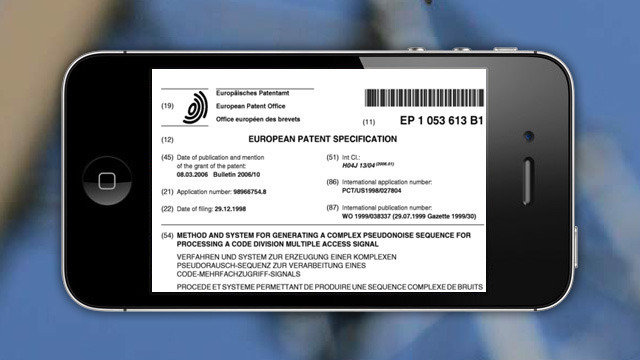
A judge in Germany has ruled that Apple does not infringe one of Motorola's claimed 3G "standards essential" patents, dismissing the related patent infringement lawsuit. The win is an important one for Apple, which has argued that patents related to 3G networking standards should not be used to gain injunctions against competitors' products that use those standards.
At issue in the lawsuit was European patent EP1053613, "Method and System for Generating a Complex Pseudonoise Sequence for Processing a Code Division Multiple Access Signal." In particular, Motorola claimed that Apple must have violated the patent if it implemented 3G networking in any device as Motorola declared it essential to 3G networking standards.
Judge Andreas Voss of the Mannheim Regional Court ruled that Motorola presented no evidence that Apple's actual implementation used the specific means of generating the pseudonoise sequence claimed in the patent. Merely arguing that the specification required generating the pseudonoise sequence was not sufficient to prove Apple infringed the patent, according to Voss.
While Apple was able to get favorable rulings in other EU courts over alleged infringement of 3G-related patents, which are encumbered by agreements to license those patents under fair, reasonable, and nondiscriminatory (FRAND) terms, the legal precedents in Germany concerning such FRAND-encumbered patents is a little more complex. A FRAND defense can only be used if a company has made an offer to license the patents in question on FRAND terms and posted a bond for expected future royalties. If a patent holder then refuses the offer and sues, the FRAND defense can be used.
Under this legal framework, Apple lost a ruling over another 3G-related patent to Motorola in December 2011. The resulting injunction forced Apple to remove iPhones and iPads from its German online store for a short period last week, though a temporary stay let Apple put the products back on sale pending the result of an appeal.
In order to gain some clarity and standardization on royalties and limits to the use of FRAND-encumbered 3G patents, Apple sent a letter to the European Telecommunications Standards Institute (ETSI), the group responsible for creating 3G standards, last November. In the letter, Apple asked that royalty rates be based on the number of patents a company owns with respect to the entire pool of patents involved in the standard. It also asked that the base for calculating the royalty be standardized on the basic hardware used to implement the standard, not on the full retail value of a device that has 3G networking capabilities. Finally, Apple asked that FRAND patents be barred from being used to gain injunctions against competitors.
Both Microsoft and Cisco made statements supporting Apple's FRAND principles after the contents of the letter were made public this week. Google, for its part, merely agreed to maintain Motorola's stance on its FRAND commitments, which it told a court could be used as "lethal weapons" against competitors.
Listing image by Photograph by Bart Heird
reader comments
42